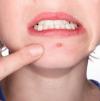
What Causes Acne?
The exact cause of acne is unknown, but doctors believe it results from several related factors. One important factor is rising hormone levels. These hormones, called androgens (male sex hormones), increase in both boys and girls during puberty and can cause the sebaceous glands to enlarge and make more sebum. Another factor is heredity or genetics. Researchers believe that the tendency to develop acne can be inherited from parents. For example, studies have shown that many school-age boys with acne have a family history of the disorder.
Factors That Can Contribute to Acne or Make It Worse
Several factors can contribute to the cause of acne or make it worse. Changing hormone levels in girls and women may cause a flare in their acne 2 to 7 days before their menstrual period starts. Hormonal changes related to pregnancy or starting or stopping birth control pills can also cause acne. Stress, particularly severe or prolonged emotional tension, may aggravate the disorder.
In addition, certain drugs, including androgens, lithium, and barbiturates, are known to cause acne. Greasy cosmetics may alter the cells of the follicles and make them stick together. Friction caused by leaning on or rubbing the skin or the pressure from bike helmets, backpacks, or tight collars can contribute to or worsen acne. Also, environmental irritants (such as pollution and high humidity), squeezing or picking at blemishes, and hard scrubbing of the skin can make acne worse.
Myths About the Causes of Acne
 There are many myths about what causes acne. Chocolate and greasy foods are often blamed, but research has shown that foods seem to have little effect on the development and course of acne in most people. Another common myth is that dirty skin causes acne; however, blackheads and other acne lesions are not caused by dirt.
There are many myths about what causes acne. Chocolate and greasy foods are often blamed, but research has shown that foods seem to have little effect on the development and course of acne in most people. Another common myth is that dirty skin causes acne; however, blackheads and other acne lesions are not caused by dirt.
Who Gets Acne?
People of all ages get acne, but it is most common in adolescents. Nearly 85 percent of adolescents and young adults between the ages of 12 and 24 develop the disorder. People of all races can have acne, but it is more common among Caucasians. For most people, acne tends to go away by the time they reach their thirties; however, some people in their forties and fifties continue to have the disorder.
Reprinted from the Archives of US NATIONAL INSTITUTES OF HEALTH, National Institute on Aging






























